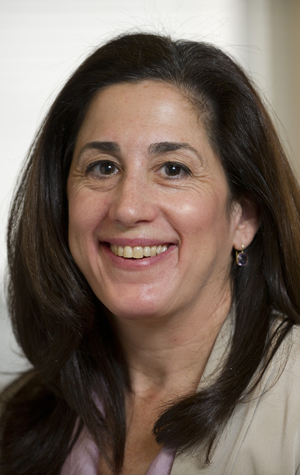Pronouncin’ Yah “Ahs”
SAR alum helps Bostonians speak sans accent

“I don’t know how to bake a seven-layer wedding cake with marzipan decorations.”
“It’s really not that hard.”
“Do you think I could run a half marathon?”
“It’s really not that hard.”
Reading from a list of short dialogue exercises, Sean and Julian are enunciating clearly, trying not to give away their eastern Massachusetts roots.
“That was an awesome serve,” continues Sean, a stoutish, bespectacled redhead in his late 40s.
“It’s really not that hard,” replies Julian, a muscular, well-groomed 20-something in a tight designer T-shirt.
“How do you get that hair to look so perfect every day?” Sean reads aloud, genuine curiosity creeping into his voice.
Julian, whose thick, dark locks are indeed stylishly coiffed, finally goes off script. “I’ll tell ya, it takes a lawdda eff ’t!”
Welcome to Accent Modification class. Hosted by Boston Casting, Inc., the four-week course is taught by Marjorie Feinstein-Whittaker (SAR’83). The students are local actors seeking roles other than Townie Barmaid and Traffic Cop No. 1.
The Bay State has experienced a boom in film production over the past several years, creating opportunities for homegrown talent—the Boston chapter of the Screen Actors Guild grew by 30 percent between 2006 and 2009. But only so many of those feature films are the gritty gangster flicks where a native’s accent is an asset. Plenty of movies are simply shot, not set, in the area; their roles require neutral speech patterns.

That’s where Feinstein-Whittaker comes in. A speech and communication specialist who works largely with nonnative English speakers, she also gives lessons to New Englanders who want to tone down their regional color for professional purposes.
A New Jersey native, Feinstein-Whittaker is no snooty Professor Henry Higgins trying to turn a flower peddler into a fair lady. “There is absolutely nothing wrong with an accent,” she says. “Accents are great….They’re part of who we are.” The former hospital speech-language pathologist with experience treating head trauma victims also stresses that her Boston- and foreign-bred clients are “clients—not patients. An accent is not a disorder.”
Locals who come to her don’t really want to lose their Boston accent. They want to be able to adopt a standard American accent at will, whether they’re film and television actors tired of being typecast, broadcasters and voiceover artists working on commercials run nationally, or business and other professionals who feel their accent conveys the wrong impression.
In the Boston Casting course and in individual appointments, Feinstein- Whittaker teaches students to avoid tensing their lip, tongue, and jaw muscles, and she leads them in speaking exercises designed to instill standard pronunciation.
Quirks of the local accent, she says, include non-rhoticity, meaning the /r/ sound is often replaced by neutral vowels, so “Kenmore Square” becomes “Kenmaw Squayeh.” Furthermore, Bostonians deviate from standard American English in vowel pronunciation: apparently, in the rest of the country, words such as “bother” and “hot” have the same vowel pronunciation as “father” and “spa.”
Feinstein-Whittaker compiles all these rules and exercises in her workbook Boston Rules (part of her ESL Rules series). There’s no “rain in Spain,” but users do have to correctly read aloud sentences such as “Courtney Porter is a 44-year-old mortgage broker.” There’s even a Boston-themed Jeopardy! trivia game, where the answers might be Quincy Market or Charlestown—but not “Quincy Mahket” or “Chahlestown.”
Of course, communication is often serious business. Many of Feinstein- Whittaker’s nonnative-English-speaking clients are British-educated medical professionals who want to learn American idioms and rhythms in an effort to be better understood—often crucial in a fast-paced hospital.
You don’t have to be a trained speech pathologist to do accent training, but it sure helps, says Feinstein-Whittaker, who also writes articles and gives presentations for audiences of therapists and language experts. “Having a very thorough understanding of communication in general, learning styles, and reinforcement techniques really was very helpful in developing this niche,” she explains.
Does she ever work with actors from out of town, to make them more convincing when portraying locals? “I haven’t,” she says, “because I’m not a native, so I’m not the right person for that. But if you took my Boston Rules book and did everything backwards—say those words without the Rs, leave off the NGs—that would probably do it.”
Patrick L. Kennedy can be reached at plk@bu.edu.
A version of this story appeared in the 2012 edition of Impact.
Comments & Discussion
Boston University moderates comments to facilitate an informed, substantive, civil conversation. Abusive, profane, self-promotional, misleading, incoherent or off-topic comments will be rejected. Moderators are staffed during regular business hours (EST) and can only accept comments written in English. Statistics or facts must include a citation or a link to the citation.